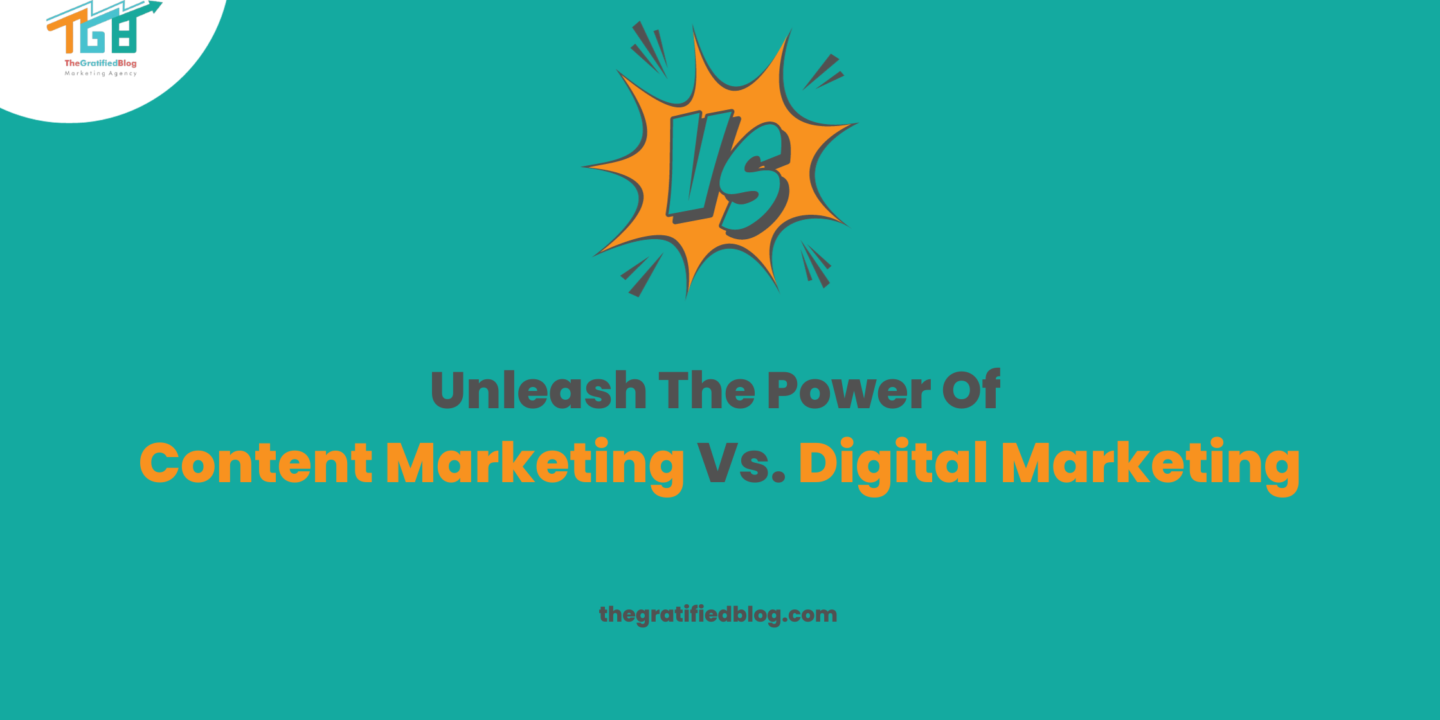
In today’s rapidly changing digital world, businesses continually look for ways to effectively reach their audiences, capture leads, and enhance their brand’s online presence. In this quest, two critical strategies often take center stage: content marketing and digital marketing. Think of them as a dynamic duo, collaborating to assist businesses in their online success. However, it’s crucial to understand what these strategies entail and how they set themselves apart.
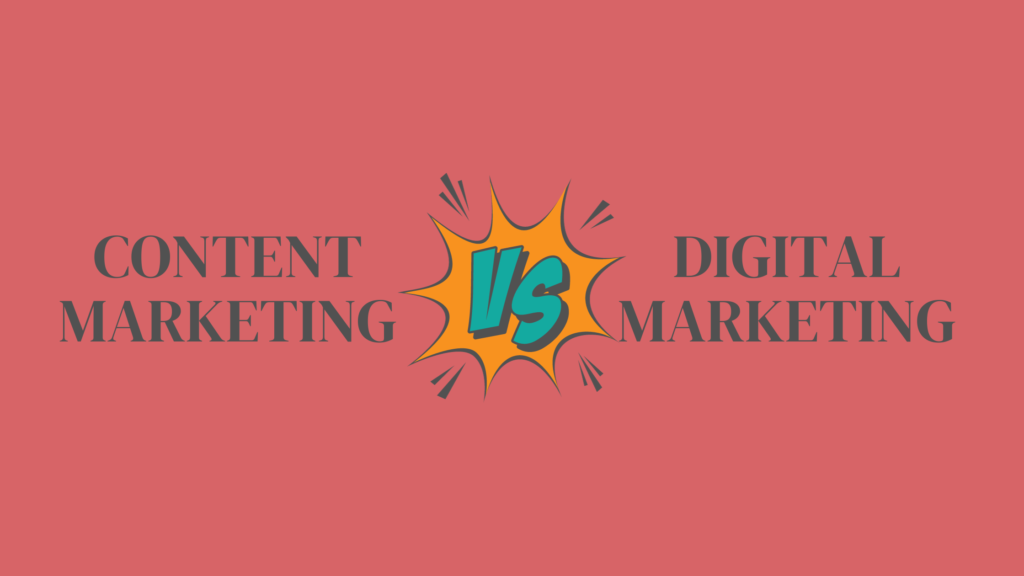
This blog post will dive deep into content marketing vs. digital marketing. We’ll delve into understanding the concepts of Content Marketing and Digital Marketing, analyze the distinctions between them, and finally draw a conclusion.
So, whether you’re a seasoned marketer looking to fine-tune your strategies or a business owner trying to decide where to invest your resources, this guide will help you understand each in a better way.
Let’s begin by defining these concepts before we proceed to compare and contrast content marketing vs. digital marketing.
So, let’s get started:
What Is Content Marketing?

Content marketing involves a strategic approach to crafting and disseminating information and distribution. Create valuable, pertinent, and consistent content to captivate and involve a precisely defined target audience.
Critical Components Of Content Marketing
- High-quality content begins with creating informative, engaging, and valuable content. Identifying the intended audience is crucial when creating content, whether it Takes the shape of blog posts, articles, videos, infographics, podcasts, and more.
- Target Audience: Understanding your audience is crucial. Successful content marketing involves thorough audience research to determine preferences, pain points, and interests.
- Content Strategy: A well-defined content strategy outlines your goals, the types of content you’ll create, how and where you’ll distribute it, and the campaign timeline.
- SEO Optimization: Content should be optimized for search engines (SEO) to improve visibility in search results. Which involves using relevant keywords and meta tags and creating user-friendly content.
- Promotion and Distribution: Content must be promoted by Utilizing different avenues like social media and email marketing to disseminate information, guest posting, and more to reach a wider audience.
Benefits Of Content Marketing
- Establishing Authority: It allows you to share your expertise, insights, and knowledge with your audience. Over time, consistently producing valuable and informative content builds credibility and trust within your industry. This authority status can help you gain the respect of your audience and position your brand as a go-to source for information.
- Increased Traffic: Creating high-quality, SEO-optimized content can attract organic traffic from search engines. Addressing topics and questions your target audience is searching for can drive more visitors to your website. This increased traffic improves your online visibility and exposes more potential customers to your brand.
- Lead Generation: It provides opportunities to capture leads. You can offer valuable resources like ebooks, whitepapers, or webinars in exchange for user information through forms or subscriptions. That allows you to grow your contact list with potential customers who have shown interest in your content, giving you a chance to nurture and convert them into paying customers.
- Economical: Content marketing is frequently more budget-friendly than traditional advertising methods like TV or print ads. While it may require an initial investment in content creation, the long-term benefits and ROI are higher. Additionally, the internet’s vast reach and targeting capabilities make reaching a large and relevant audience possible without the high costs associated with traditional advertising.
- Long-Term Results: Its impact can compound over time. As your content accumulates on your website and other online platforms, it attracts organic traffic and generates leads. Unlike some digital marketing tactics that offer immediate but short-lived results, content marketing provides sustainable benefits that can continue to grow and deliver value for months or even years after the content is published.
Now, let’s understand a bit about digital marketing-
What Is Digital Marketing?
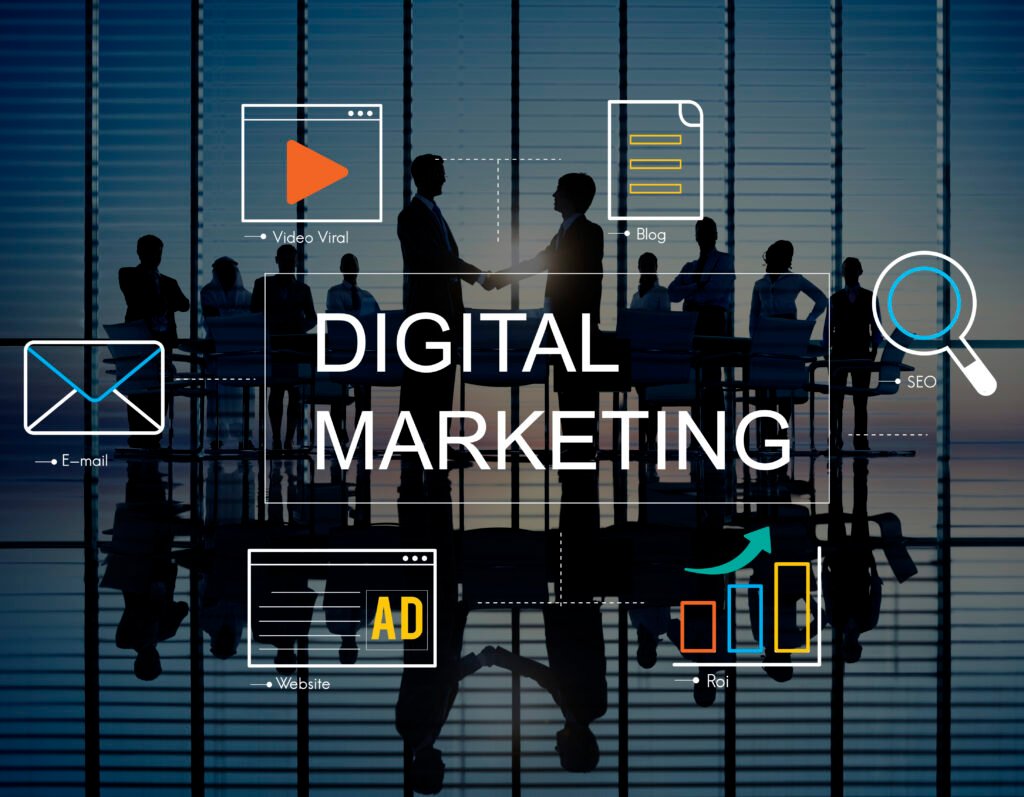
Digital marketing is an all-encompassing marketing approach encompassing various strategies and channels that leverage Leveraging digital channels, platforms, and technologies to market products or services to a specific audience.
Unlike traditional marketing, digital marketing utilizes the internet and various online tools to connect with potential customers, build brand awareness, and drive conversions.
Critical Components Of Digital Marketing
- Website: A well-designed and user-friendly digital marketing The basis of a successful online presence is a well-designed and user-friendly website. A thriving online presence. It is the online hub where customers can learn about your business, products, and services.
- Search Engine Optimization (SEO): Optimizing your online content to attain elevated positions in search engine results facilitates easier discovery of your website by potential customers.
- Social Media Marketing: It involves utilizing social media platforms for promotional purposes to connect with your audience, distribute content, and execute focused advertising campaigns.
- Email Marketing: Sending relevant emails to subscribers for lead nurturing, product promotions, and customer engagement.
- Pay-Per-Click (PPC) Advertising: Paid advertising Utilizing platforms like Google Ads and social media to generate targeted traffic and conversions.
Benefits Of Digital Marketing
- Broader Reach: It enables businesses to expand their reach globally by leveraging the internet’s borderless nature. It breaks down geographical barriers, allowing you to connect with potential customers worldwide and increase your brand’s exposure and potential customer base.
- Cost-Effective: Unlike conventional advertising approaches like print or television ads, digital marketing is more budget-friendly and often offers more budget-friendly options. Plus, you can adjust your spending in real-time, optimizing your campaigns for better cost efficiency.
- Targeted Advertising: These platforms provide precise targeting tools, allowing you to define and reach specific demographics, interests, and behaviors. That ensures that your marketing message is delivered to the right audience, increasing the chances of engagement and conversion.
- Measurable Results: It offers robust analytics and tracking tools that provide real-time data on the performance of your campaigns. You can track essential metrics like website traffic. Click-through rates and conversion rates. This approach, driven by data, enables you to adjust your strategy strategies for better results.
- Increased Conversions: Effective digital marketing strategies can lead to higher conversion rates than traditional methods. By optimizing your online presence, targeting the right audience, and delivering compelling content, you can boost engagement and persuade more visitors to take desired actions, ultimately driving sales and revenue growth.
Now, with a basic understanding of content and digital marketing, let’s examine how these strategies differ.
Content Marketing Vs. Digital Marketing
Content and digital marketing are essential components of a comprehensive marketing strategy. Let’s explore their differences in detail:
Goals And Objectives
Content Marketing:
- Goal: The primary goal of content marketing is to provide valuable, relevant, and informative content to your target audience. It aims to establish trust, build brand authority, and nurture long-term customer relationships.
- Objectives: Content marketing objectives often include increasing brand awareness, educating the audience, driving organic traffic, and positioning the brand as an industry leader.
Digital Marketing:
- Goal: It encompasses a broader range of goals, including promoting products or services, driving immediate conversions, and increasing sales or leads through various digital channels.
- Objectives: It can include achieving a specific return on investment (ROI), boosting online sales, increasing website traffic, or generating leads through paid advertising.
Target Audience
Content Marketing:
- Audience Focus: It strongly emphasizes understanding the audience’s needs, preferences, and pain points. Content is tailored to address these specific concerns.
- Engagement: It aims to engage the audience through informative and valuable content, fostering community and trust.
Digital Marketing:
- Audience Targeting: It utilizes data-driven targeting to reach a specific demographic or customer segment based on age, location, interests, and behavior.
- Conversion-Oriented: It aims to drive immediate actions, such as purchasing, subscribing to a newsletter, or completing a form contact form.
Content Creation Vs. Advertising
Content Marketing:
- Content Creation: It involves creating various forms of content, including blog posts, videos, infographics, and podcasts, to engage and inform the audience.
- Promotion: While content is promoted, the promotion is often subtle, focusing on sharing and distributing content via natural channels such as social media and email.
Digital Marketing:
- Advertising: Digital marketing heavily relies on paid advertising methods like Google Ads, social media ads, and display ads to promote products or services directly.
- Conversion Funnel: It often employs a conversion-focused approach, guiding users through a sales funnel to encourage immediate action, such as purchasing.
Long-Term Vs. Short-Term Results
Content Marketing:
- Long-term Focus: A long-term strategy takes time to build authority, trust, and a loyal audience. Results may take time but can be sustainable over time.
- Cumulative Effect: Its impact accumulates, providing increasing returns as more high-quality content is produced.
Digital Marketing:
- Short-term Focus: It often seeks to deliver immediate results, primarily through paid advertising campaigns that drive quick conversions or sales.
- Short-Lived: Results from digital marketing campaigns may be more short-lived, requiring ongoing investment to maintain momentum.
Cost And ROI
Content Marketing:
- Cost: It can have lower upfront costs, especially when using organic channels. However, content creation and distribution require a significant investment in time and effort.
- ROI: Measuring the ROI of content marketing can be challenging but often provides long-term benefits regarding brand loyalty and authority.
Digital Marketing:
- Cost: It can have higher upfront costs, particularly with paid advertising campaigns. The budget can be adjusted based on goals and performance.
- ROI: Measuring ROI in digital marketing is typically more straightforward, as it involves tracking immediate sales, leads, or conversions directly attributed to specific campaigns.
Also read: Difference between content marketing vs Inbound marketing
Conclusion
Now that we’ve explored the difference between these two strategies, it’s important to discern when, why, and how to deploy each according to your specific needs and goals.
If you still have any questions related to the topic, please leave them in the comments section. We will be happy to answer you.
Thanks for reading 🙂




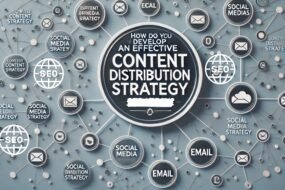
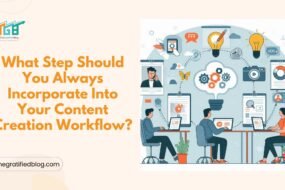
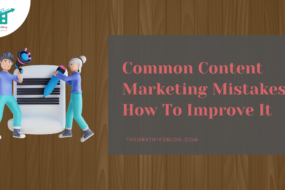

No Comments